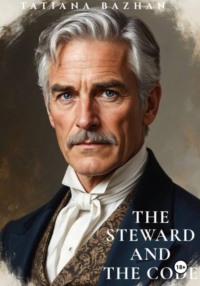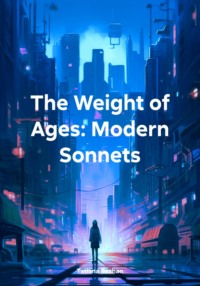
Полная версия
Twisted stories
Mr. Plumson, quite charmed, simply smiled. “I understand perfectly,” he said, winking. “One can appreciate the beauty of a rose without knowing its Latin name, can't one? Now, tell me, have you seen the one with the… you know… the… music?” And Beatrice, relieved and delighted, launched into another enthusiastic, completely nameless, review. After all, what's in a name? For Beatrice Bumblebee, Art was a feeling, a whirlwind of emotions, a breathtaking experience, and knowing the actual title would have been, well, utterly superfluous. And besides, “the one with the music” was much easier to remember.
The Sartorial Saboteur

Old Silas Finch, purveyor of sartorial splendour (or what passed for it in Oakhaven), considered himself a master of his trade. He could coax a rumpled houndstooth into an elegant suit worthy of the mayor, and his alterations were legendary. But Silas had a secret, a vexing imperfection that haunted him more than a frayed cuff or a mismatched button: a hole, not in his fabric, but in his own pocket. It wasn't a large hole, mind you, barely enough to lose a stray coin or two. But it was a symbol, a tiny, persistent flaw in a life meticulously crafted and stubbornly maintained. He'd mend it, time and again, only to find it resurrected, a tiny, mocking grin stitched into the lining.
Silas, naturally, attributed the hole to the cheap thread he'd been buying from young Timmy down at the general store, a cost-saving measure he justified with elaborate arguments about the fickle economy. He swore off Timmy's thread, replaced it with the finest Italian silk he could find, and meticulously repaired the offending pocket. For a week, he felt a surge of triumph, a renewed sense of order restored to his universe. He even started humming old tunes while he pressed a particularly stubborn wrinkle out of a tweed jacket.
Then came the day Mrs. Abernathy, the mayor's wife, arrived with a gown demanding immediate alterations for the upcoming gala. Silas, eager to please, reached into his supposedly mended pocket for his measuring tape. His fingers groped, then stilled. He pulled his hand out, his face paling beneath his spectacles. Not the tape, but a single, solitary button nestled in the palm of his hand. A button, identical to the ones he had painstakingly sewn onto Mrs. Abernathy's gown. And as the mayor's wife launched into a tirade about hemlines and expectations, Silas Finch finally understood: the hole wasn't a flaw in the fabric, but a convenient little escape hatch for his own anxieties, a subtle act of self-sabotage born from a life lived too perfectly, too rigidly. The hole, it seemed, wasn't a problem at all, but a tiny, rebellious act of freedom.
The Stargazer of P.S. 23

Maurice, a man whose tie perpetually battled a losing war against gravity, arrived at Public School 23 with the lofty title of “Science Instructor.” But Maurice's science was of a purely celestial, and rather internal, variety. While earnest young minds buzzed with questions about the pollination of peonies or the digestive tract of the earthworm, Maurice's gaze was fixed, utterly and completely, on the acoustic-tile heavens above.
His classroom, a theatre of the absurd, played out daily. Little Timmy would pipe up, “Mr. Henderson, what's photosynthesis?” And Maurice, eyes still lost in the labyrinthine patterns of the ceiling, would murmur, “Ah, photosynthesis… a delicate dance of photons, a silent symphony of chlorophyll… yes, quite.” The answer, a verbal Jackson Pollock, meant everything and nothing, leaving Timmy both impressed and utterly bewildered. The children quickly learnt that the key to surviving Maurice's class was to ask questions to which the answers did not matter.
Years marched on, doing their best to imitate a particularly brisk drill sergeant. The bright-eyed students of P.S. 23 scattered to the winds, armed with Maurice's vague pronouncements and a healthy dose of skepticism. Time, that relentless sculptor, chiseled away at Maurice, leaving him a frail, stooped figure, a shadow of his former, ceiling-gazing self.
One day, Maurice found himself in a predicament. Old age, that notorious trickster, had played a cruel joke, leaving him with an ailment as baffling as one of his own lectures. He needed help, and quickly. Desperate, he recalled the faces of those bygone students, faces he barely registered during his years of ceiling-gazing enlightenment. He remembered little Susie, who was always asking about the migration patterns of butterflies, and now he got a letter from his family saying she was one of the best doctors in the country. There was also young Pete, who wondered if the stars were actually streetlights. Apparently, he was now a famous astrophysicist.
Fortune, it seemed, had an ironic sense of humour. The very students who had suffered through his abstract lessons were now the pillars of the medical and scientific community. The doctor, the scientist, and even the pharmacist, all alumni of P.S. 23, gathered around Maurice's bedside. They spoke in terms he mostly had no clue about it, but they seemed to know what to do. And while their prescriptions and diagnoses were far more grounded than his old pronouncements on the “silent symphony of chlorophyll,” one thing became clear: even a life spent staring at the ceiling could, in its own peculiar way, cultivate a harvest of unexpected kindness and help. After all, even stars need a little help sometimes.
Bruce's Diet

Bruce Butterlad, a man whose waistline was rapidly outpacing his paycheck, held a peculiar position: head chef at the “Little Lambs” kindergarten. Now, Bruce wasn't exactly known for his culinary artistry. His repertoire consisted mostly of glorified mush and suspiciously-coloured gelatin. But what he lacked in skill, he made up for in… appetite.
You see, Bruce had a secret ingredient in his kindergarten concoctions, and it wasn't listed on any recipe card. It was called “Bruce's Portion,” a generous mound of food siphoned from each child's plate before they even caught a whiff of it. “Waste not, want not,” he'd mutter, conveniently forgetting that the “want” belonged to the hungry little lambs.
His cheeks, akin to inflated balloons, betrayed his lunchtime activities. Meanwhile, the Little Lambs, once rosy-cheeked cherubs, began to resemble pale imitations of their former selves. Their once-bright eyes dimmed, their laughter faded, replaced by the distant grumbling of empty stomachs.
Miss Abigail, the kindergarten teacher, noticed the tragic transformation. “Bruce,” she'd inquire, her voice laced with concern, “are you sure these children are getting enough to eat? Tommy's starting to resemble a dandelion seed in a strong breeze.”
Bruce, ever the picture of innocence, would pat his protruding belly and declare, “They're eating like little piggies, Miss Abigail! Must be a growth spurt.” He'd then waddle back to the kitchen, humming a jaunty tune, ready to “grow” his own portion.
Karma, however, is a dish best served with a side of excruciating pain. One fateful afternoon, Bruce Butterlad found himself clutching his stomach, writhing on the linoleum floor of the kindergarten kitchen. His face, usually a rosy hue, had turned a ghastly shade of green.
The diagnosis? Pancreatitis, brought on by an excess of, well, everything. As Bruce lay in the sterile hospital bed, hooked to an IV drip, he had ample time to reflect on his dietary sins. The Little Lambs, meanwhile, were enjoying a veritable feast of donated pizzas, their laughter echoing through the halls of the kindergarten.
The moral of the story? Don't bite the hand that feeds you, especially if that hand belongs to a hungry kindergartner. And remember, a “balanced” diet involves more than just stuffing your own face. Sometimes, a little self-control is the best medicine of all.
Marcus and the Timekeeper

Marcus, a man whose life seemed perpetually stuck on “pause,” was known around Oakhaven for two things: his prodigious appetite for Mrs. Higgins' apple pie and the small, velvet-lined box he carried with him everywhere. This wasn’t just any box; it was THE box, the one he claimed held a timepiece of such historical significance it could make the Smithsonian jealous. A watch, he’d explain with a dramatic cough, awarded to him personally by General Thunderbolt himself “for services rendered beyond the call, bordering on the miraculous, wouldn’t you say?”
The stories surrounding this watch were as plentiful as the dandelions in Mrs. Abernathy’s neglected lawn. One day it was for single-handedly rerouting a misplaced battalion during a training exercise, another for deciphering an enemy code using only a paperclip and a rubber band. Each tale, spun with increasing embellishment, always ended with General Thunderbolt, eyes twinkling, bestowing upon Marcus the coveted watch.
Of course, nobody had ever seen the watch. The box, yes, held aloft like a religious artifact during Marcus's performances, but the contents remained stubbornly veiled. “Ah, the light, you see,” he’d explain, waving a hand dismissively. “Too precious to expose to just any atmosphere. Tarnishes the… the… intrinsic value.”
Old Man Hemlock, who’d seen more bluster than a Kansas tornado, always chuckled. “Marcus,” he’d say, “you’re spinning yarns thicker than a ship’s rope. Likely the only general you ever met was the one on the Wheaties box.”
But Marcus would merely smile, a secretive, knowing smile that hinted at untold bravery and the weight of unspeakable secrets. He'd continue to cradle his velvet box, a tangible representation of an intangible glory.
The truth, as it often does, possessed a sting of the ironic. The box, unearthed from the dusty attic of his Aunt Petunia, had originally housed a set of her dentures. As for the watch? Well, that was as real as the unicorn grazing in Farmer McGregor’s cornfield. The real mystery wasn’t the watch itself, but the reason Marcus carried on with this charade. Was it a harmless yearning for recognition, a desperate attempt to inject some colour into a life otherwise painted in shades of beige? Or perhaps he’d simply become so enamoured with his own narrative that the line between reality and fantasy had blurred into oblivion.
The Curious Case of Len and the Vanished Lady

Lenny, they called him, but only behind his back and with a wink. To his face, it was Leonard, spoken with a reverence usually reserved for war heroes and guys who found a twenty in their old coat. See, Leonard had a quest. A Big One. For thirty years, he’d been chasing a phantom, a wisp of memory named Agnes, the girl who’d stolen his heart and his youthful ambitions in the summer of ‘93.
Agnes, a creature of sunshine and mischief, had vanished the day after promising him a lifetime of stolen kisses under the old oak tree. She left no note, no forwarding address, just a Leonard with a broken heart and a suitcase full of dreams.
And so began Leonard's odyssey. He traversed continents like a wandering minstrel searching for his muse. He saw the Eiffel Tower, not for its iron grandeur, but for any sign of the girl with auburn hair and a laugh like wind chimes. He wandered the bustling markets of Marrakech, his ears perked for a familiar lilt in a foreign tongue. He climbed the Himalayas, hoping perhaps the thin air would carry her name on the breeze. Each city became a page in his diary of lost love, each face a cruel reminder of the one he sought.
He traded his youthful exuberance for seasoned weariness, his savings for plane tickets and dusty hotel rooms. The world, in all its vibrant tapestry, became a backdrop to his personal drama. His heart was a compass forever pointing toward Agnes, a needle stuck on “maybe.”
Then, one Tuesday morning, Leonard returned home. Defeated, but not broken. He shuffled into his familiar but neglected house, the garden overgrown like a metaphor for his unfulfilled life. He sighed, gazing across the lawn.
And there she was.
Agnes.
Watering petunias in the garden next door. Her auburn hair had succumbed to the silver of time, but her eyes still twinkled with that familiar mischief.
“Leonard?” she asked, her brow furrowing. “Good heavens, is that really you? What have you been up to all these years?”
Leonard could only stammer. His tongue, usually so eloquent in describing his global search, had tied itself into a knot. “Agnes? But… the world… I…”
Agnes chuckled, a sound that still held the chime of wind bells. “Oh, Leonard. After that summer, my parents moved me away to take care of my aunt and uncle, it lasted longer. I've been back for years, just too shy to say hello.”
The irony, it seemed, had not been lost on fate. The horizon of Leonard's dreams had been, for three decades, a stone's throw away; he'd been chasing the rainbow's end, only to find it was in his own backyard. He began to laugh, a deep, hearty sound, the sound of a man who has finally understood the punchline of a joke thirty years in the making. After all, O. Henry knew that life, like a good story, is best served with a twist, and a healthy dose of the absurd.
Clark's Canine Caprice

Clark, they said, was the dog whisperer of the age, a veritable canine Svengali. His act at the Bijou Theatre was the talk of the town. Imagine it: poodles pirouetting, Great Danes deciphering mathematical equations chalked on miniature blackboards, and a dachshund, bless its stubby legs, playing a mournful sonata on a tiny harmonica. The audience roared with delight, throwing roses and loose change (mostly loose change) onto the stage. Clark, with a bow as elaborate as a Parisian pastry, would soak in the adulation, his smile as wide as the Mississippi.
The secret, whispered amongst the stagehands, was Clark's “method.” Some said he used hypnotic suggestion, others, a series of ultrasonic whistles only dogs could hear. Old Mrs. Maple, who sold peanuts in the lobby, swore he'd made a pact with the devil himself. The truth, as truths often do, was far more… domestic.
Clark's real magic lay not in any arcane art, but in the unfortunate resemblance his children, Mildred, Bartholomew, and little Agnes, bore to common breeds of dog. Yes, the poodles weren't poodles, but Mildred and Bartholomew stuffed into fluffy white costumes. That Great Dane wasn't so great, just Agnes with stilts and a very convincingly painted cardboard box for a head. And the harmonica-playing dachshund? Bartholomew again, contorted in a way that would make a pretzel jealous, his fingers fumbling with the tiny instrument.
The illusion held, a glorious, ridiculous charade, bringing in enough dough to keep the wolf (or rather, the poorly disguised children) from the door. But fate, that mischievous imp, often has a trick or two up its sleeve.
One evening, during the grand finale, when “the dogs” were performing a synchronized dance that would have made Busby Berkeley weep, Bartholomew's costume, held together by spit and wishful thinking, gave way. The head of the dachshund, revealing not a drooling snout, but the flushed, embarrassed face of a ten-year-old boy.
The music screeched to a halt. The audience gasped. Mrs. Maple dropped her bag of peanuts, scattering them like tiny, accusing eyes across the floor. Clark, his face paler than a Dalmatian in a snowstorm, could only stammer, “Well, folks… that's show business!” And Bartholomew, ever the trouper, simply bowed, revealing the ripped seam in his furry costume. As the crowd recovered from their shock and then erupted in laughter, Clark knew his days of canine caprice were over only to be replaced with something he never thought he would ever experience. Family bonding.
Wendy's All-Seeing Eyes

Wendy, a man whose face seemed permanently creased in an expression of knowing amusement, was a local enigma. He possessed, or so he claimed, an uncanny prescience regarding the daily news. Bank robberies before the getaway car even cooled, mayoral scandals before the ink dried on the illicit contracts, celebrity gossip before the celebrities themselves were aware – Wendy knew it all. He spun yarns of sleepless nights, of shadowy observations, painting himself as a nocturnal vigilante, a journalistic ghost. “I've seen things, you wouldn’t believe,” he’d murmur, a glint in his eye that suggested he’d just pulled a particularly juicy secret right out of the cosmos.
The townsfolk were, to put it mildly, bewildered. Some whispered of a deal with the devil, others of a secret government program. Old Mrs. Higgins, who’d once claimed to have seen Elvis buying groceries, suggested Wendy was channeling the news directly from space aliens. The truth, as it usually does, resided in a far less dramatic, yet infinitely more ironic, corner.
Wendy, our self-proclaimed purveyor of truth and justice, harboured a secret as crumpled and unassuming as a yesterday's newspaper. He wasn’t a psychic, nor a superhero, nor a spy. He was, in fact, a humble paperboy.
Yes, while the town slumbered, dreaming of sugar plums or stock options, Wendy was out on his bicycle,slinging news at sleepy doorsteps for a modest sum. He knew the news before it was the news, because he had a stack of it under his arm, hours before it hit the stands.
The metaphor lies in the fact that Wendy was “delivering” the news in more ways than one. He literally delivered it, but, more importantly, he crafted and delivered a persona of knowledge and mystery based on a profession one wouldn't expect to be the source. He transformed the mundane into the extraordinary, the pedestrian into the profound, much like O. Henry himself used to do.
His nightly escapades, rather than involving daring feats of espionage, consisted of battling overzealous dogs and mastering the art of throwing a rolled-up newspaper with pinpoint accuracy. His “sleepless nights” were fuelled by lukewarm coffee and the burning ambition to finish his route before the sun rose. Yet, from this mundane reality, he spun a web of intrigue, making himself the oracle of their small, gossipy world.
The irony, thick enough to spread on toast, was that Wendy, in his elaborate act, was simply delivering the news in more ways than one. The truth of his “prescience” was hidden in plain sight, obscured by the very news he peddled. After all, who would suspect the paperboy of knowing the secrets of the universe, or at least, of Main Street?
Andy's Finish Line

Andy, a gentleman seasoned by eighty years and a generous helping of life's spices, held court each morning on his balcony. His kingdom? A rusty wrought-iron perch overlooking Central Park, a green lung breathing life into the city's concrete chest. His entertainment? The daily parade of joggers, those spandex-clad sprites flitting across the park's arteries.
Now, Andy wasn’t just watching. He was remembering. Each puff of his morning cigar seemed to conjure a thicker cloud of nostalgia. He'd observe a particularly fleet-footed runner, a blur of determined limbs, and a glint would spark in his eye, like a forgotten ember rekindled. Ah, yes, those were the days.
“Used to be me, you know,” he'd confide to the pigeons cooing expectantly at his feet. “A regular Mercury. A gazelle. A… a wind-up toy wound a little bit too tight, maybe, but a champion nonetheless!”
He was a celebrated sprinter. Ribbons and medals (entirely gold, of course) adorned the walls of his mental trophy room. He'd relive races with breathtaking detail, describing opponents vanquished with the flourish of a seasoned storyteller. “Young buck from Poughkeepsie, thought he had a chance! Pah! Left him eating my dust. More like eating air, I tell ya!”
One blustery morning, a particularly ambitious young woman, headphones blasting, sprinted past, her face a mask of determined exertion. Andy watched, a flicker of something akin to… regret?… crossing his features.
“She's got the fire,” he muttered, grinding out his cigar. Then, a mischievous glint returned. He leaned forward, cupping his hands to his mouth.
“Dig deep, kid! Dig deep! Remember, it's all in the hips! And for heaven's sake, breathe! Breathe like you're trying to inflate a hot air balloon!”
Конец ознакомительного фрагмента.
Текст предоставлен ООО «Литрес».
Прочитайте эту книгу целиком, купив полную легальную версию на Литрес.
Безопасно оплатить книгу можно банковской картой Visa, MasterCard, Maestro, со счета мобильного телефона, с платежного терминала, в салоне МТС или Связной, через PayPal, WebMoney, Яндекс.Деньги, QIWI Кошелек, бонусными картами или другим удобным Вам способом.






